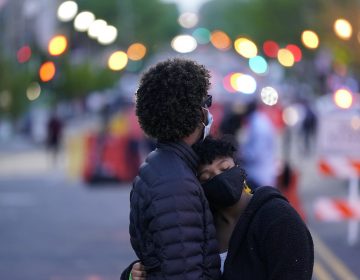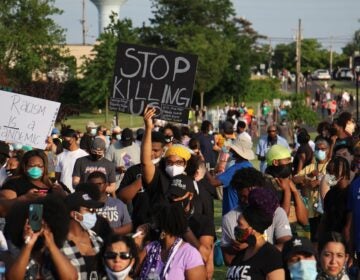In Camden, a son’s death moves parents to ‘break the silence’ on mental health issues
Nah’Jole Frazier had been dealing with mental health issues when he was struck by a driver earlier this month. Now, his parents want to address a need for better services.
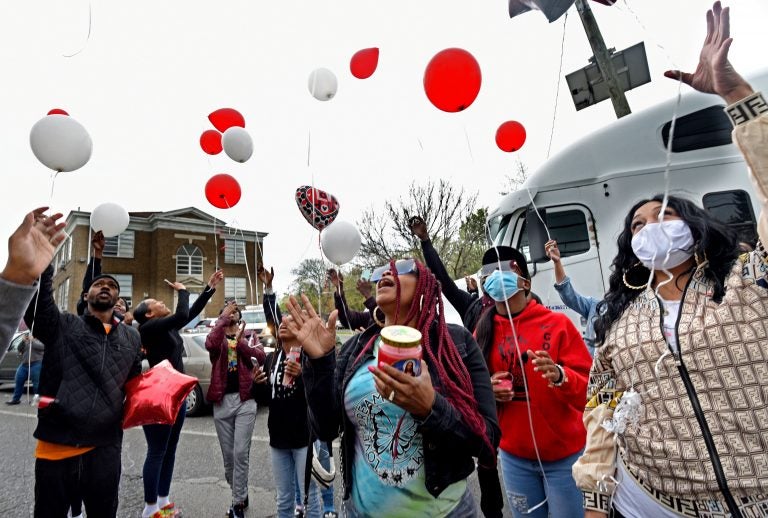
Tomeka Holmes (center) leads family and friends in a balloon release in her son's memory at a Camden vigil on April 14, 2021. (April Saul for WHYY)
It had been a torturous time for the parents of 20-year-old Nah’Jole Frazier.
The young Camden man — a talented rapper known as Lil Zeek — took a solo trip to Atlanta in March to bolster his music career.
In his absence, Gary Frazier Jr. and Tomeka Holmes received soul-crushing phone calls about their son, who had attention deficit hyperactivity disorder, bipolar disorder, and schizophrenia.
The first was from a Florida police precinct informing them he’d been arrested and was being sent to a psychiatric facility. Then, after they’d bought him a plane ticket home and he’d missed the flight, a hospital in South Carolina phoned to say he was being held there for mental health reasons.
“I didn’t want to get the call that my son was DOA,” said Holmes.
She got that call earlier this month, when Nah’Jole Frazier was struck and killed by a driver about 9 p.m. on April 13 in the Fairview section of the city.
A witness said that Frazier had fallen while crossing a dimly-lit stretch of Collings Avenue with his 15-year-old half-sister, Siani Custis. Custis said he pushed her out of the way of the oncoming car before he was hit. The driver remained at the scene and has not been charged.
The accident may not have been related to Nah’Jole Frazier’s mental health issues, but it sealed his father’s determination “to break the silence” in a community that doesn’t easily speak about mental illness and to address the need for better services for people like his son.
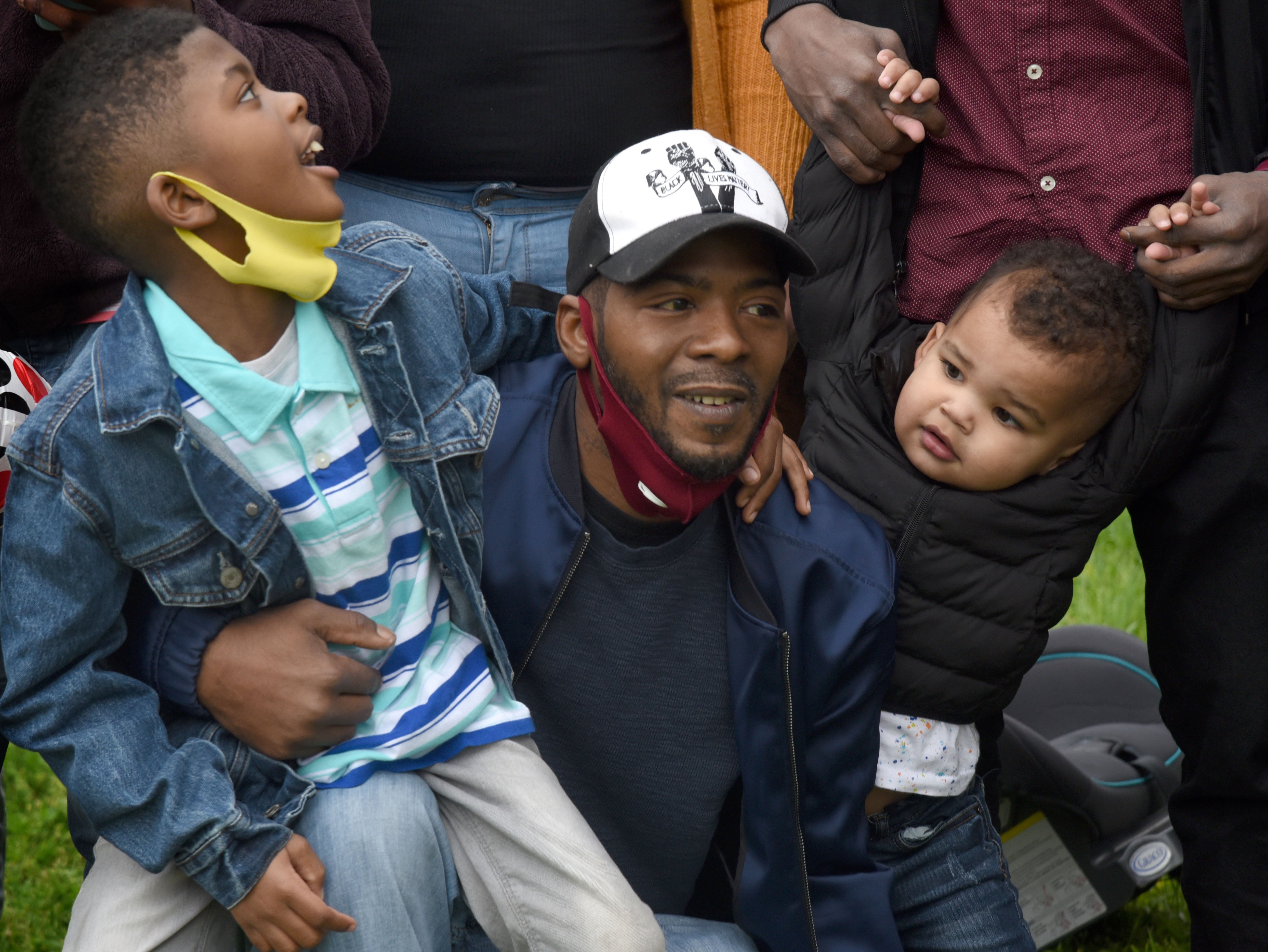
Gary Frazier was particularly motivated by an experience after his son returned from the trip down South, less than a month before he was killed. Family members had called police for help getting the young man into a crisis center. Officers handcuffed him, then turned him over to emergency medical personnel that Gary Frazier said were dismissive of his son’s diagnoses and allowed him to run away. Nah’Jole Frazier went missing for 18 hours; Frazier has lodged a complaint about the EMTs.
A longtime activist, Frazier wants to work with Camden County police — who he said were invaluable in locating his son after the EMTs let him go — to establish safeguards for people with mental illnesses.
“Maybe,” he said, “they could be in some sort of database so when the police come onto a scene, they know. God forbid that my child had come into contact with any officer out here who was not familiar with my son’s social mental history; then, we might have been looking at a different kind of tragedy.”
He has discussed his idea for a mental health alliance with Camden County Police Lt. Vivian Coley, and they both said they plan to continue those conversations.
At a time of national outcry over Black people killed by police officers, a 2020 report by the Treatment Advocacy Center estimated that between 25% and 50% of people shot and killed by police have mental illness, and that mentally ill individuals are 16 times more likely to be killed during an encounter with law enforcement than other civilians. However, according to a 2015 survey by the Police Executive Research Forum, new recruits spend roughly 58 hours in firearms training — and only eight hours learning crisis intervention.
As a young Black man with mental illness, Nah’Jole Frazier was doubly at risk.
However, during his son’s disappearance, Gary Frazier said the Camden County Police launched an all-out search, setting up coordinates at Frazier’s home, placing an officer at his door all night, and putting his son’s medical history in their computers under his name. After Nah’Jole was found, Frazier said officers continued to reach out and were helpful in getting the young man into another facility, where he was treated for three weeks until he was back on medication and stable.
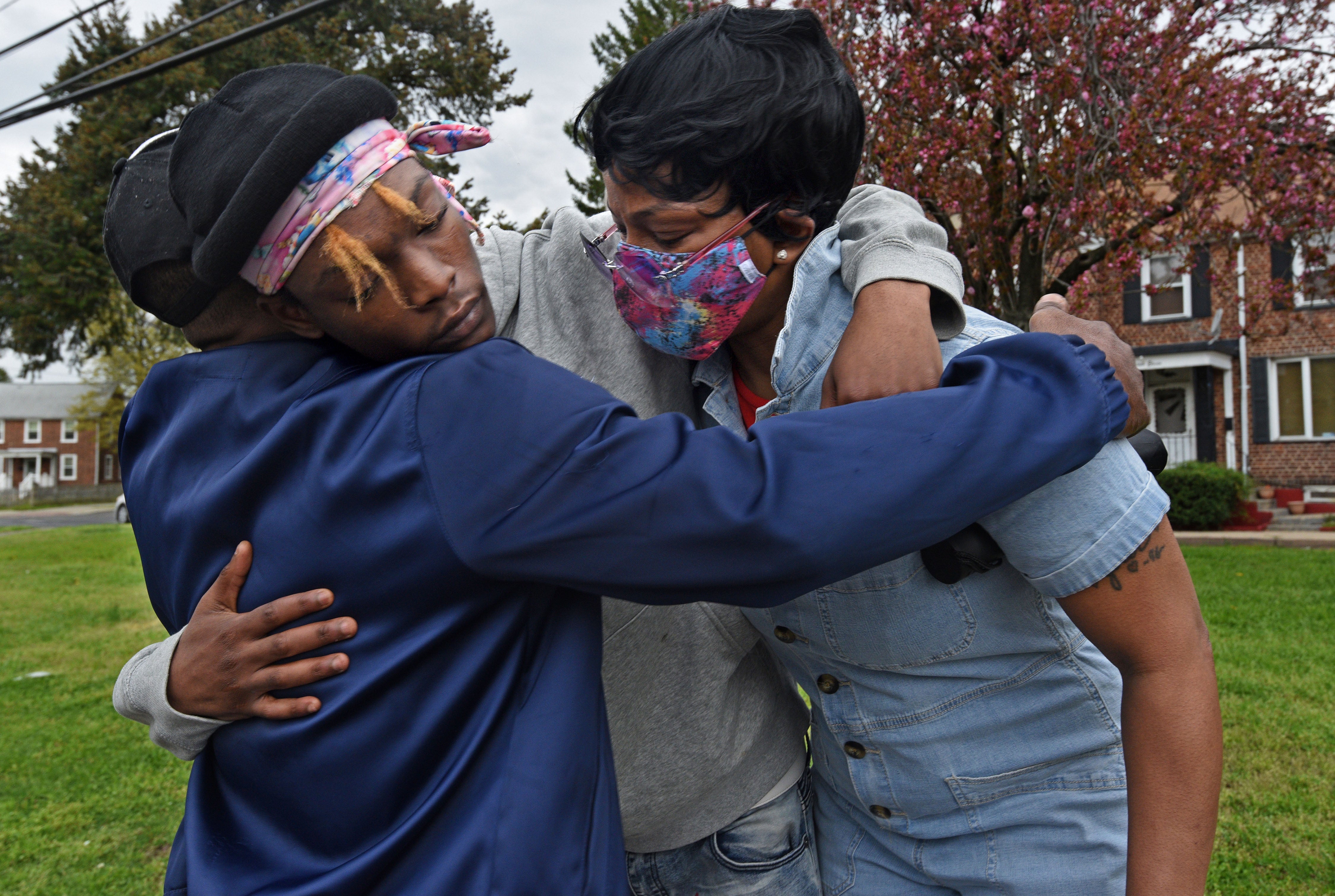
“It shows me the integrity and the heart and the willingness of this force to go above and beyond for our people,” said Frazier, who is now “eternally grateful” to the department he had criticized often since the county took over policing of Camden in 2013, following deep budget cuts.
Many residents say the Camden County Police Department is making strides in community policing. Law enforcement officials said last year that excessive force complaints have dropped 95% since 2014, when the department led the state with 65 documented complaints. There’s been a push to hire more officers from the city, and current police chief, Lt. Gabriel Rodriguez, is an East Camden native.
Lt. Coley said officers receive extensive training on crisis intervention and de-escalation techniques. Coley is particularly proud of a 2015 YouTube video that depicts a group of Camden officers following a man Coley described as “emotionally disturbed” while asking him to drop the knife he was wielding.
“They walked with him slowly for 12 blocks,” she said, “and got him to put down the knife.” Officers can be seen on the video arresting the man, who Coley said later received treatment.
As Nah’Jole Frazier was buried on Saturday, his father expressed guilt over what he calls years of denying his son’s mental health issues, including encouraging him to make that trip to Atlanta.
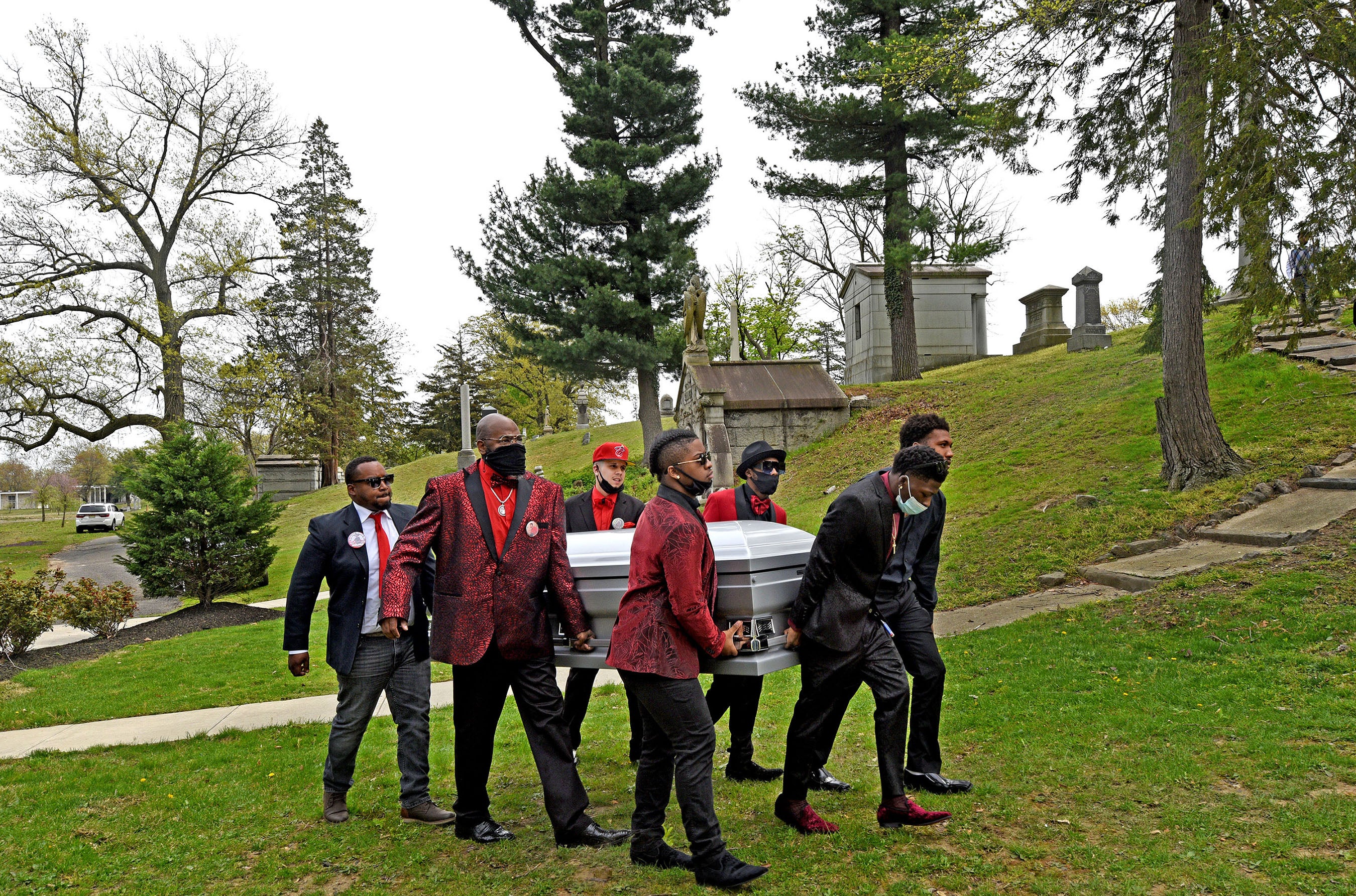
“I didn’t want him to be different,” Gary Frazier said, “I told him he was okay until he started believing that himself. I felt like I helped him stay in denial, telling him to chase his dreams.”
Tracey Hall, a retired Camden police officer, was moved to start the DaeLight Foundation to help “the inner city community raise awareness on suicide/prevention” — according to its website — after her son took his own life.
Hall said she sees attitudes toward mental illness beginning to change in Camden.
“We’ve been told for so long to get over things,” she said. “And then there are religious issues. It was always, ‘Pray on it, give it to God, God will fix it.’ It’s just culturally where Black and brown people have been.”
Often a person with mental health issues is viewed as “a reflection on how you were raised, and that’s not always the case,” said Hall. Recently, she counseled three Camden teens who had asked their parents to help them get therapy, and were told “no.”
She also cites the high cost of mental health care in a city with an estimated 36% of residents living in poverty.
“If the cost of a therapist is from $85 to $150 an hour, how many people can afford it out of the pocket?”
In some situations, free counseling is available in the city.
Barbara Maronski, associate vice-president of trauma and violence prevention at Camden’s Center for Family Services, said in addition to regular outpatient services, the center currently has grant funding that provides free counseling for anyone who has lost a family member to homicide or has someone in the home with substance abuse issues.
But it may not be easy for a therapist from outside the city to gain the trust of Camden’s young people, said Nyzia Easterling, who founded the nonprofit Saving Grace Ministries to help children traumatized by violence.
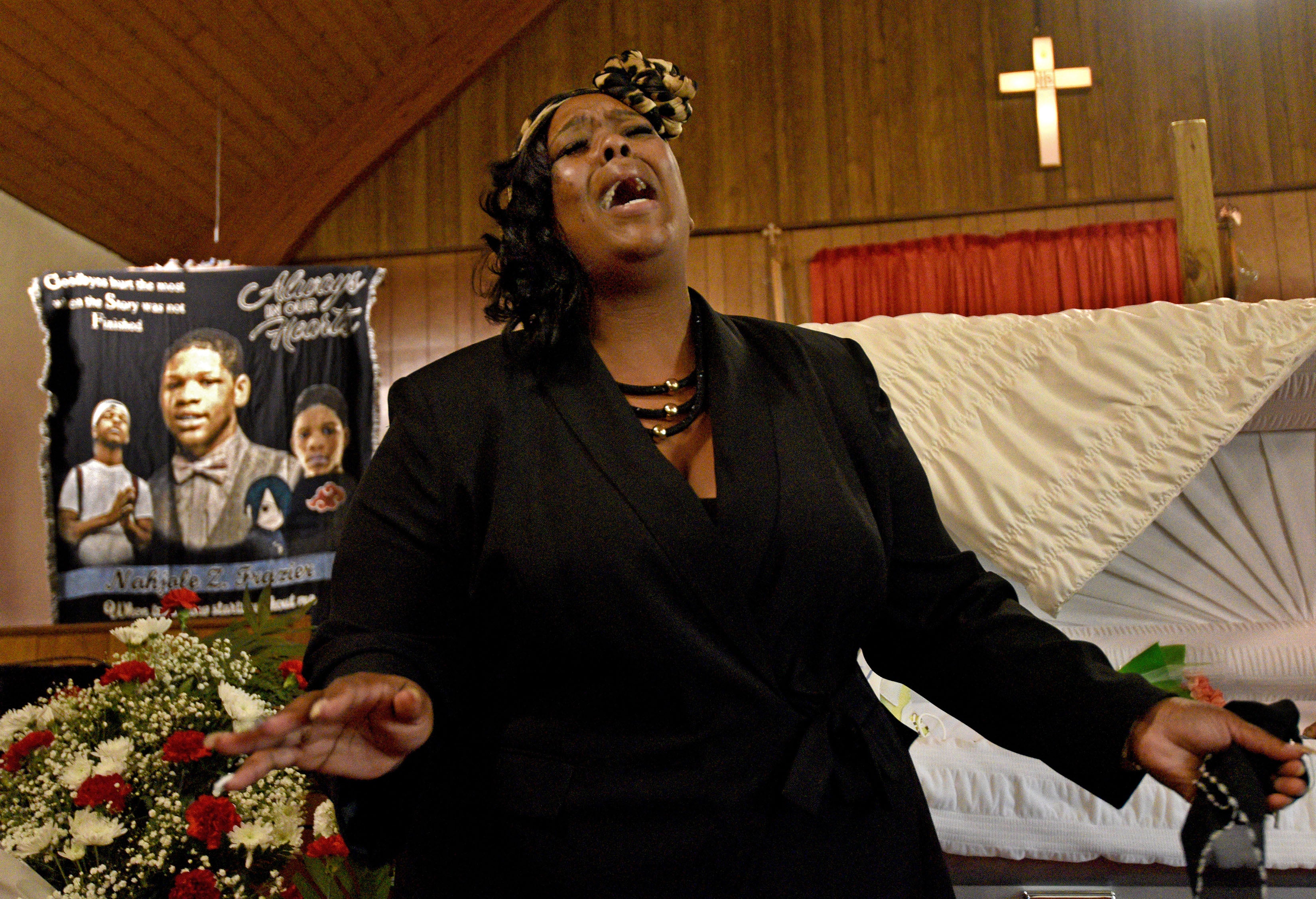
“Our children don’t always connect with counselors and therapists,” she said. “They may feel like, ‘You don’t look like me, you don’t walk like me, you’re not from our community, you don’t wake up and go to sleep at night with the sound of guns going off.’”
Judyann McCarthy, mental health program manager at the Camden County Educational Services Commission, is currently supervising the implementation of a new grant program that places mental health professionals in New Jersey schools free of charge. To date, nearly 200 schools throughout the state have applied.
Andrea Aumaitre, project manager for the city’s School Based Youth Services Program, said the Camden School District intends to apply for that program to increase the number of licensed social workers in the schools. In the meantime, SBYSP is currently state-funded to provide counseling in a half-dozen Camden public schools. Aumaitre said they work closely with the Center for Family Services, partner with local organizations like Saving Grace, and provide ongoing training for guidance counselors and child study teams in trauma-informed care.
Aumaitre said that because parental consent is required, “demystifying mental health support is important” when working with families.
“When a person in a family has a diagnosis, it’s important to treat not only that individual but those that are affected,” she said. “In the last five to 10 years, we have learned that you have to treat the whole family, like with addiction.”
Tomeka Holmes said she adjusted more readily to her son’s mental health issues because her mother was also diagnosed with bipolar disorder and schizophrenia. She was used to the mood swings that can come with those conditions.
“Nah’Jole would cuss me out one day and a few minutes later, say, ‘I love you,’” she said.
As he got older, it became heartbreaking.
“Seeing him as an adult who didn’t want to take his meds anymore, I couldn’t do anything to help him,” Holmes said. “That’s the part that hurt me.”
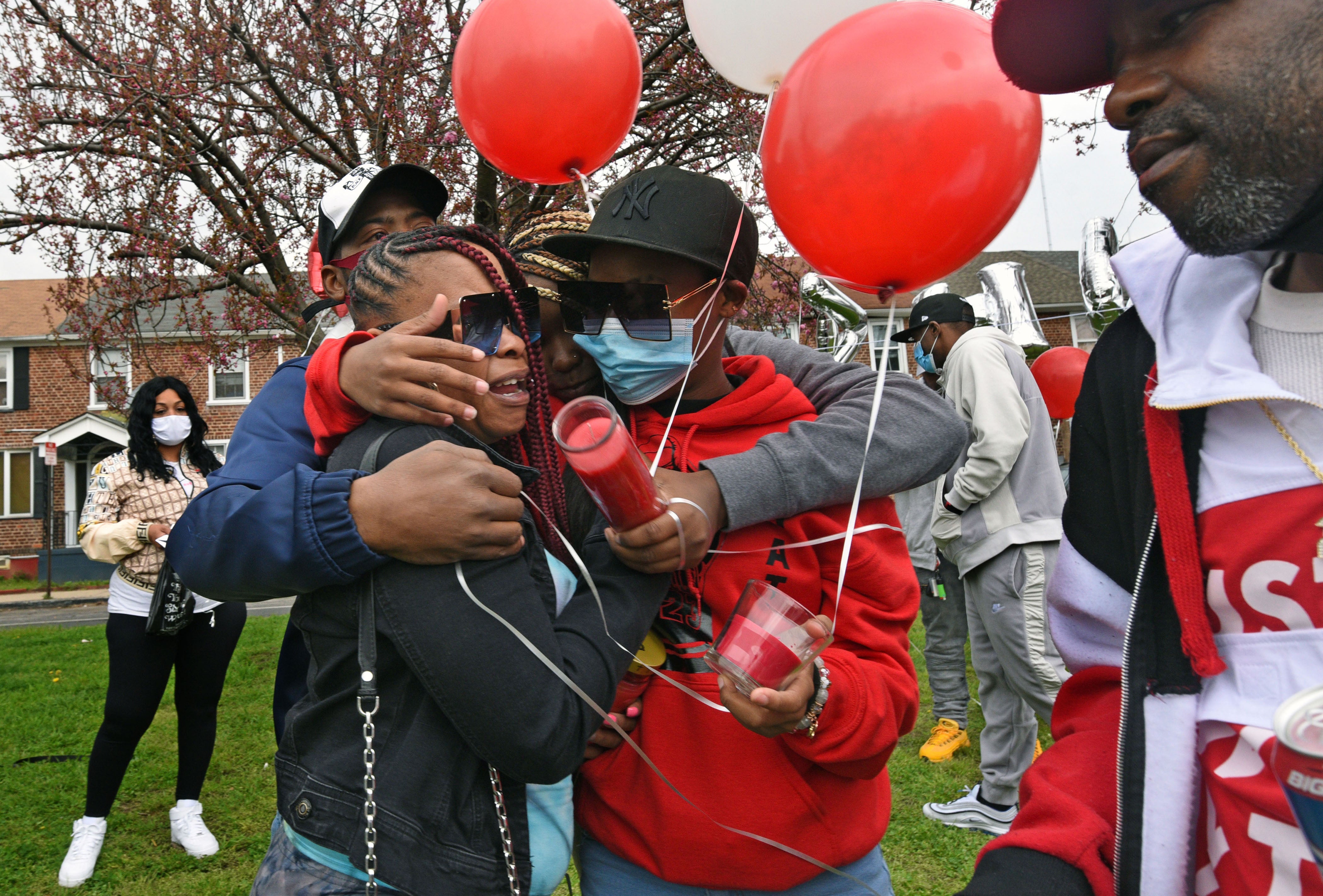
Nah’Jole Frazier’s family members and friends are comforted that his last act — which they believe saved his sister’s life — was a selfless one.
“My son was a caregiver and a protector of his sisters,” said Holmes. “He always loved to help people.
“All he wanted was to stop the voices in his head.”

Get daily updates from WHYY News!
WHYY is your source for fact-based, in-depth journalism and information. As a nonprofit organization, we rely on financial support from readers like you. Please give today.



